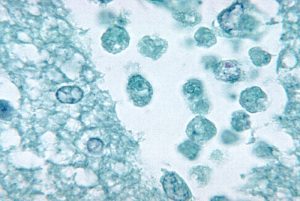By NewsDesk @infectiousdiseasenews
Officials with the Directorate General Health Services in Pakistan have already reported 11 fatalities due to parasitic meningitis infections caused by Nageleria fowleri, and now a 12th case has been reported.

Image/CDC
According to The News, 16-year old Muhammad Sohaib, from the Mehmoodabad area, is battling for life at the National Medical Center (NMC) Karachi.
“Patient Sohaib was brought in unstable condition to us and medical investigations revealed that he is infected with Naegleria fowleri. Currently, he is on ventilator,” a doctor said on condition of anonymity.
Naegleria fowleri is a microscopic amoeba which is a single-celled living organism. It can cause a rare and devastating infection of the brain called primary amebic meningoencephalitis (PAM). The amoeba is commonly found in warm freshwater such as lakes, rivers, ponds and canals.
Infections can happen when contaminated water enters the body through the nose. Once the amoeba enters the nose, it travels to the brain where it causes PAM (which destroys brain tissue) and is usually fatal. Infections usually occur when it is hot for prolonged periods of time, which results in higher water temperatures and lower water levels.
Naegleria fowleri infections are rare. Most infections occur from exposure to contaminated recreational water. Cases due to the use of neti pots and the practice of ablution have been documented.
The practice of ablution is included in Yogic, Ayurvedic, and Islamic traditions. Within the Islamic faith, ritual nasal rinsing is included in a cleansing process called “wudu” or “ablution.” It is usually performed several times a day in preparation for prayer, according to the Centers for Disease Control and Prevention.
Polio cases in 2019 double last year, Nigeria’s major milestone
You cannot be infected with Naegleria fowleri by drinking contaminated water and the amoeba is not found in salt water.
Initial symptoms of PAM usually start within 1 to 7 days after infection. The initial symptoms may include headache, fever, nausea, or vomiting. Other symptoms can include stiff neck, confusion, loss of balance, seizures, and hallucinations. After the start of symptoms, the disease progresses rapidly.



2 thoughts on “Pakistan: 12th ‘brain-eating amoeba’ case reported in Karachi”